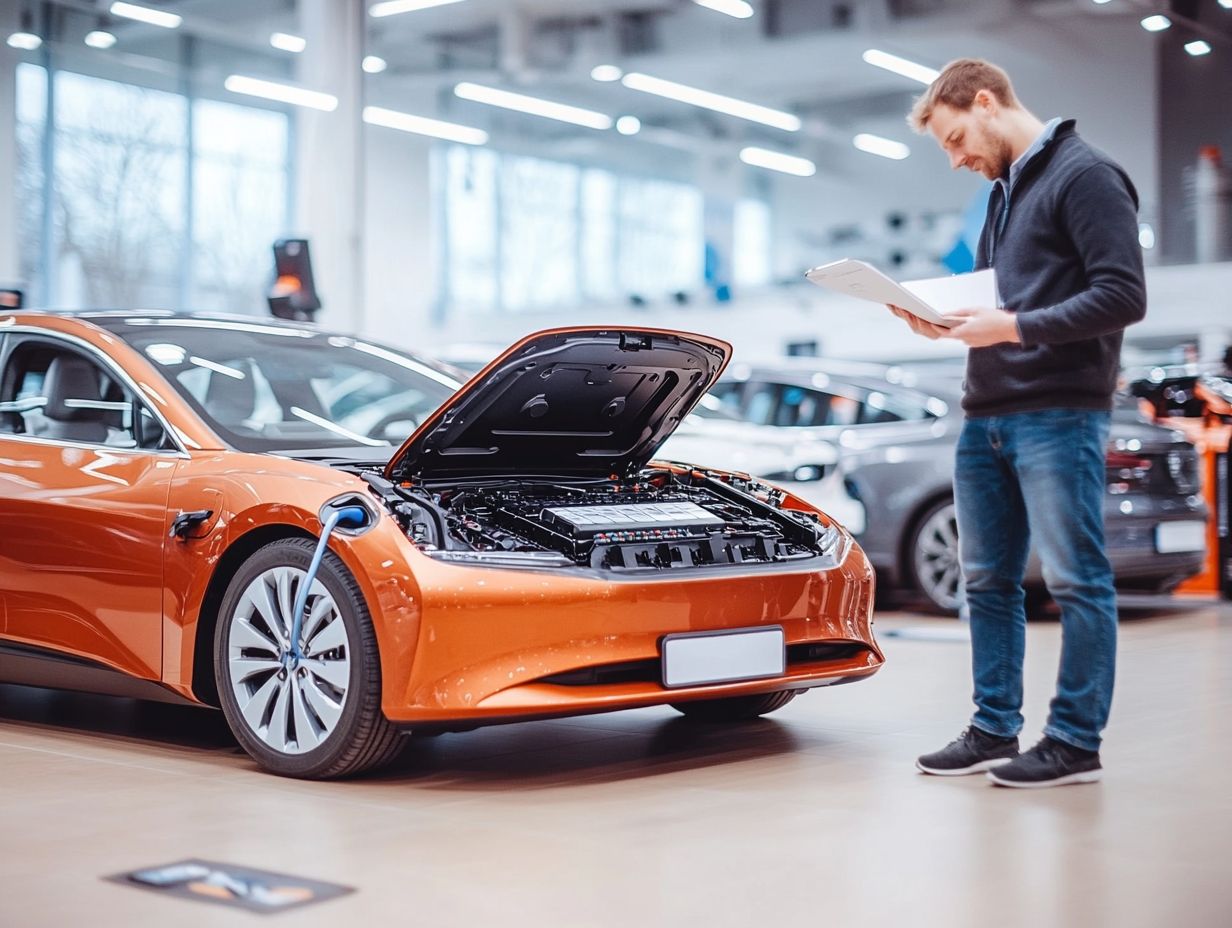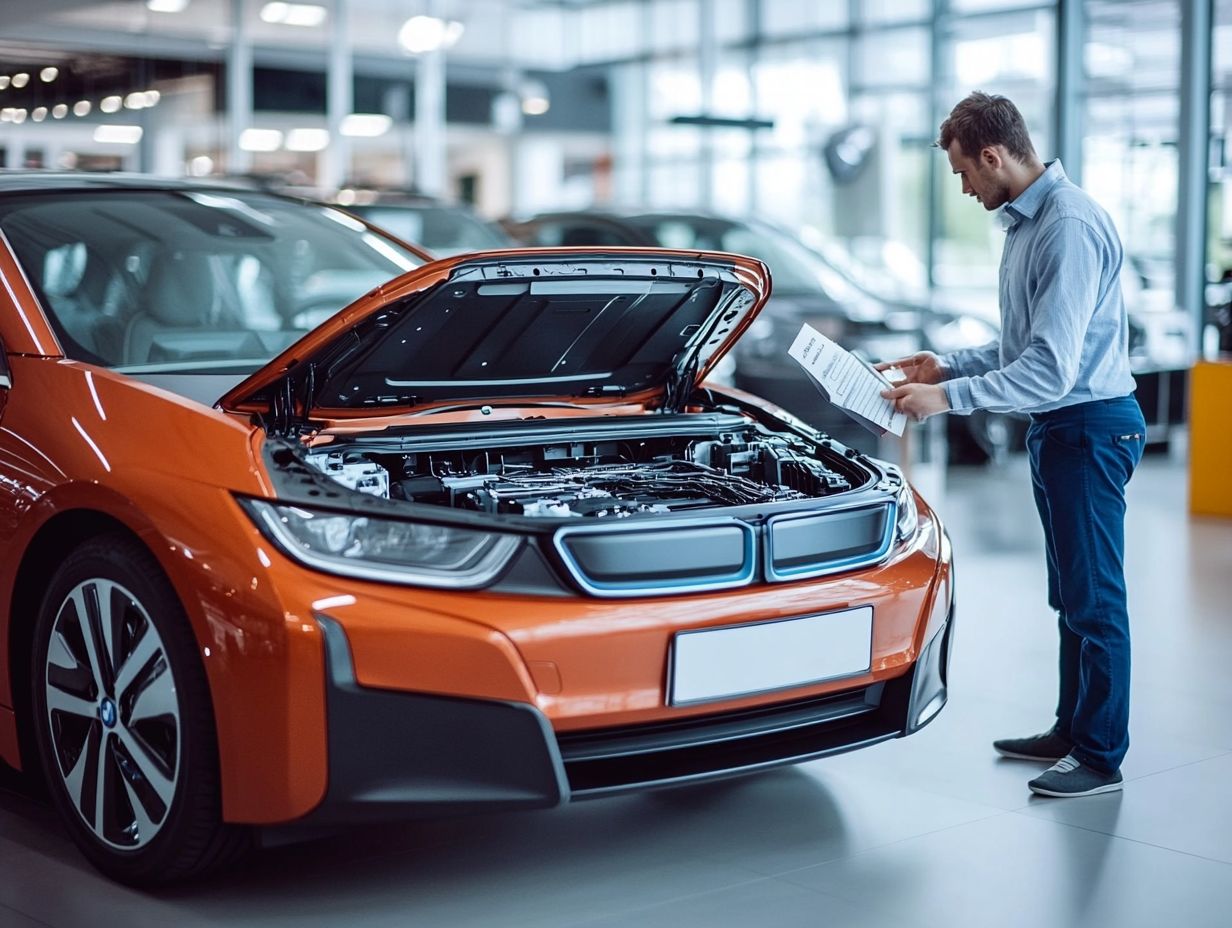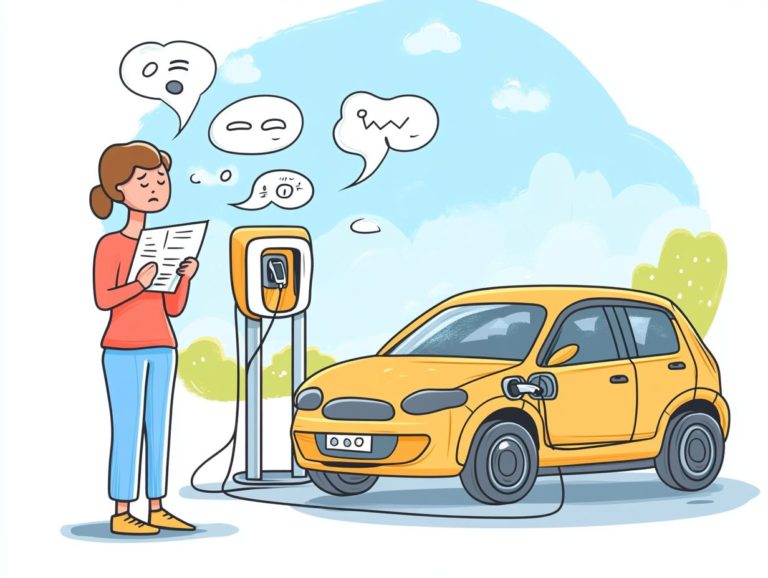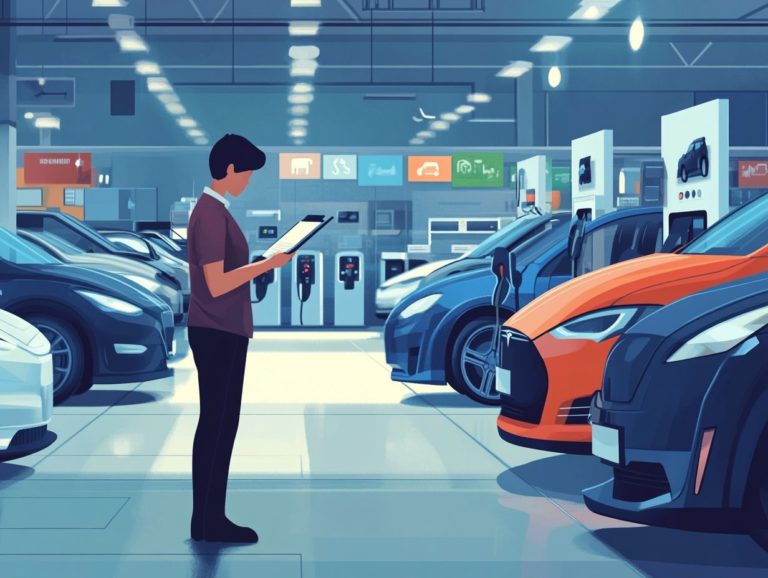5 Mistakes to Avoid When Buying a Used EV
Purchasing a used electric vehicle (EV) can be a smart decision, but it’s crucial to approach the process with care. By steering clear of common pitfalls, you can save yourself time, money, and avoid potential headaches in the future.
From researching the right model and brand to grasping the details of battery health, every step holds significant importance for a seamless purchase.
Dive into five essential mistakes to avoid and gain insights on how to maximize your investment. Furthermore, uncover the benefits of owning a used EV and the key considerations for ensuring a successful transition.
Contents
- Key Takeaways:
- 1. Not Doing Enough Research on the Model and Brand
- 2. Not Getting a Pre-Purchase Inspection
- 3. Not Checking the Battery Health
- 4. Not Considering the Availability of Charging Stations
- 5. Not Negotiating on Price
- What Are the Benefits of Buying a Used EV?
- Frequently Asked Questions
- What are the top 5 mistakes to avoid when buying a used EV?
- Are there any specific brands or models of used EVs to avoid?
- Should I get a used EV inspected by a mechanic?
- What are the benefits of buying a used EV over a new one?
- Can I negotiate the price of a used EV?
- What should I look for when test driving a used EV?
Key Takeaways:

- Research is key when buying a used EV to avoid buying a model with known issues or a brand with a poor reputation.
- A pre-purchase inspection helps you avoid expensive repairs and reveals any potential problems with the vehicle.
- Checking the battery health is crucial when buying a used EV as it can greatly affect the overall performance and lifespan of the car.
1. Not Doing Enough Research on the Model and Brand
When you’re considering the purchase of an electric vehicle, like the stylish Tesla Model 3 or the ever-popular Renault Zo , it’s vital to dig deep into your research. You want to ensure your choice aligns perfectly with your needs and expectations.
Understanding the nuances of various electric cars and their brands becomes essential, particularly when examining elements such as battery technology. This aspect greatly influences driving range and efficiency, making it a key factor in your decision-making process.
Many buyers often overlook warranty options that can offer peace of mind and financial security as time goes on. Check customer reviews for real-world experiences that might influence your decision.
For example, taking a closer look at models like the luxurious Audi e-tron GT, celebrated for its rapid charging capabilities, in contrast to the compact and budget-friendly Smart Fortwo, noted for its agility in urban environments, can help you determine which vehicle features resonate best with your lifestyle. This insight ultimately guides you in making an informed and satisfying purchase.
2. Not Getting a Pre-Purchase Inspection
A pre-purchase inspection is an essential step when you’re considering a used electric car. It allows you to assess vital components like battery health and the overall condition of the vehicle, helping you avoid future headaches. This crucial step evaluates the State of Health (SOH), meaning how well the battery is performing compared to when it was new, ensuring it aligns with your expectations for performance and longevity.
Research shows that nearly 30% of used electric vehicles exhibit signs of battery degradation that could affect their range and efficiency. A thorough inspection typically involves checking the battery’s capacity, voltage, and charging capabilities, while also examining other critical systems such as the powertrain and electrical components.
By prioritizing this crucial step, you can uncover issues that might not be immediately obvious, potentially saving yourself thousands in unexpected repairs down the line.
Considering that a replacement battery can set you back anywhere from $5,000 to $15,000, understanding the current health of the battery is crucial for making an informed purchasing decision.
3. Not Checking the Battery Health
Neglecting to check the battery health of a used electric vehicle could lead to disappointment, as the performance of the battery is intricately tied to the actual range and overall driving experience. Understanding the condition of the battery is crucial, especially when considering options like battery rental or purchasing lithium-ion models.
To effectively assess battery health, it s essential to examine the State of Health (SOH), which reveals the battery’s current capacity in comparison to its original capacity. Regularly using diagnostic tools allows you to identify any signs of degradation. A battery in poor health may lead to reduced range and slower acceleration, making it vital for you as a prospective buyer to prioritize battery assessments in your evaluations.
Many manufacturers now provide battery rental programs, which can ease concerns about battery longevity. This ensures you have access to a reliable power source without the burden of potential degradation or replacement costs.
Take charge of your EV journey today! Conduct thorough research and inspections, including understanding the pros and cons of buying used EVs, to make the best possible choice.
4. Not Considering the Availability of Charging Stations

When considering the purchase of an electric vehicle, it s crucial to check for charging stations. Overlooking this aspect can lead to inconvenience and limitations, especially if you want to take advantage of high-power charging modes.
Identifying accessible charging points and knowing the types of charging cables you’ll require is key to ensuring a smooth ownership experience.
There are several types of charging stations available, ranging from home setups for convenient overnight charging to public networks strategically placed along highways.
Understanding the differences between Level 1, Level 2, and DC fast charging can make a big difference. Level 1 chargers provide a slower charge, ideal for overnight home use.
Level 2 chargers offer a quicker alternative for both home and public locations. On the other hand, DC fast chargers are a type of charger that quickly fills up your vehicle’s battery, perfect for those longer journeys.
Understanding how each charging mode works can help you enhance your comfort and confidence while driving an electric vehicle.
5. Not Negotiating on Price
In your journey to purchase a used electric car, neglecting to negotiate on price can put you at a distinct disadvantage, especially as the market evolves and various government aids emerge to help lower overall costs. To avoid common pitfalls, be sure to learn about the top misconceptions about buying an EV.
Knowing the latest market trends helps you grasp the fair market value and use available discounts or offers, giving you the power to secure a more favorable deal.
Delving into local government programs can uncover financial assistance options that make your purchase significantly more attainable.
By arming yourself with knowledge about the vehicle’s condition and scrutinizing its pricing history, you can approach negotiations with confidence.
This knowledge shows the vehicle’s real value and helps you negotiate better, countering any inflated pricing claims from sellers.
Don t miss out on the chance to negotiate better prices! A strategic and well-informed approach will turn the negotiation process into a rewarding experience, leading to a purchase that meets your expectations.
What Are the Benefits of Buying a Used EV?
Buying a used electric vehicle presents you with a wealth of advantages, from significant cost savings to environmental benefits, particularly as the EV market expands and diversifies.
These vehicles typically come with lower purchase prices, and you may even qualify for government incentives that further enhance the affordability of ownership.
With enticing incentives like tax credits and rebates, the overall cost of acquiring a used electric car can drop dramatically, making it an appealing choice for those conscious of their budget.
Choosing a pre-owned model not only helps you reduce the carbon footprint linked to manufacturing new vehicles, but also aligns with the growing movement toward sustainability.
Many used electric vehicles boast well-maintained batteries that continue to perform efficiently, reinforcing their longevity.
When you think about the financial savings, environmental impact, and the potential for reliable battery health, the case for transitioning to a used electric vehicle becomes irresistibly compelling.
Take charge of your electric vehicle journey today!
What Are the Most Reliable Used EV Models?
When considering a used electric vehicle, reliability should be at the top of your list. Models like the Renault Zo , Tesla Model 3, and Hyundai Ioniq 5 have built solid reputations for dependable performance.
It s wise to explore the reliability of various options, including the Porsche Taycan and Audi e-tron GT. This information empowers you to make informed decisions.
Consumer feedback and expert reviews are invaluable in assessing these electric vehicles. Many Tesla Model 3 owners rave about its long-lasting battery life and impressive maintenance record.
Meanwhile, the Hyundai Ioniq 5 garners high praise for its exceptional build quality and reliable aftermarket service. Industry statistics further underline these points, with reports showing that the Renault Zo consistently ranks high in customer satisfaction, particularly due to its low maintenance costs.
Comparative analyses of warranty claims and repair frequencies can also provide vital evidence supporting these reliability claims. This information helps you avoid unexpected issues and ensures a smooth driving experience.
What Are the Common Maintenance Costs for a Used EV?

It’s essential to grasp the common maintenance costs for a used electric vehicle so you can budget effectively. These costs can vary significantly from those of traditional cars.
Regular maintenance may involve battery diagnostics to ensure optimal battery health and expenses related to different charging modes.
You might also encounter costs associated with software updates, necessary for keeping the vehicle s systems operating efficiently and securely.
Unlike traditional vehicles, which usually incur expenses for oil changes and frequent engine checks, electric vehicles require maintenance less often.
However, it s wise to factor in the price of home charging equipment installation and any public charging fees you may encounter.
By examining these factors collectively, you can uncover potential savings over time, leading to a more informed decision as you transition to cleaner energy alternatives.
How Can One Determine the Battery Health of a Used EV?
Determining the battery health of a used electric vehicle is crucial for ensuring optimal performance. This involves evaluating its State of Health (SOH), or a measure of the battery’s overall condition and remaining capacity, and actual range metrics.
To accurately assess battery health, start with a thorough visual inspection. Look for any signs of swelling, leaks, or corrosion on the terminals these could indicate underlying issues.
After this initial check, employ diagnostic tests using specialized apps or handheld devices. These tools can reveal essential metrics such as charge cycles, voltage levels, and temperature variations.
These tests not only help you gauge the immediate status of the battery but also assist in predicting its future performance.
Understanding the implications of battery health is vital. A degraded battery can lead to a reduced driving range and efficiency, ultimately impacting your vehicle s overall lifespan and functionality.
What Are the Factors to Consider When Negotiating on Price?
Negotiating on price when purchasing a used electric vehicle requires an understanding of several critical factors, including the vehicle’s battery health, market trends, and available government aids that could influence the overall cost.
Being well-informed about the vehicle’s condition and the current EV market significantly enhances your bargaining power.
Assessing the vehicle’s mileage and service history is essential, as these elements contribute to its overall value and longevity.
You should also consider external incentives, such as tax rebates and local dealership promotions, which can help ease the financial burden.
Presenting documented evidence of these factors like vehicle inspections or comparative market analyses creates a compelling case during negotiations.
Establishing a rapport with the seller while clearly articulating the reasoning behind your offer can lead to more favorable terms.
Ultimately, being prepared with comprehensive knowledge not only boosts your confidence but also positions you advantageously in discussions.
How Can One Ensure a Smooth Transition to Owning a Used EV?
Ensuring a seamless transition to owning a used electric vehicle requires thorough preparation and a solid understanding of how to charge the vehicle, the health of its battery, and where charging stations are located. Additionally, being aware of the top features to avoid in an EV is essential. Taking a test drive before finalizing the purchase is crucial; it can help you assess if the vehicle fits your lifestyle.
To prepare effectively, familiarize yourself with the specific battery and charging requirements of the electric vehicle model you’re considering. This knowledge will ensure it aligns with your driving habits and daily travel distances.
Exploring local charging infrastructure is equally important. It highlights nearby fast-charging stations and aids in developing a reliable charging routine. As a potential owner, consider adapting your driving habits. Optimizing routes to include charging stops can significantly enhance your efficiency.
The test drive is a pivotal step in the process. It allows you to experience the vehicle’s performance firsthand and determine whether it meets your comfort and functional needs in everyday driving scenarios.
Watch the video above to learn more about the benefits of owning a used electric vehicle!
Frequently Asked Questions

What are the top 5 mistakes to avoid when buying a used EV?
- Not considering your driving needs: Evaluate your daily driving needs before buying a used EV. Ensure the range and charging options fit your lifestyle.
- Not researching the vehicle’s history: Check the used EV’s background thoroughly. Look for any accidents, maintenance records, and recall information.
- Skipping a test drive: It’s crucial to take a test drive before purchasing a used EV. This allows you to assess the vehicle’s performance and identify any potential issues.
- Not understanding the battery health: The battery is the heart of an EV. Understand its health before buying. Ask for the battery’s warranty and check how much charge it can still hold compared to when it was new.
- Not considering the cost of ownership: Many make the mistake of only looking at the initial purchase price. Also consider long-term costs like insurance, maintenance, and charging expenses.
Are there any specific brands or models of used EVs to avoid?
While there aren’t specific brands or models to avoid, research and read reviews from other EV owners. Additionally, consider following 5 tips for test driving an electric vehicle to help guide your decision by identifying common issues or complaints.
Should I get a used EV inspected by a mechanic?
Yes, it s always a good idea to have any used vehicle inspected by a mechanic before purchasing. They can identify potential issues and give you an idea of the vehicle’s overall condition.
What are the benefits of buying a used EV over a new one?
One of the main benefits of buying a used EV is cost savings. Used EVs generally have a lower purchase price than new ones. Some states also offer incentives and rebates for purchasing used EVs.
Can I negotiate the price of a used EV?
Yes, you can negotiate the price of a used EV just like any other car. Research the market value of the specific make and model to gain leverage when negotiating with the seller.
What should I look for when test driving a used EV?
When test driving a used EV, pay attention to the vehicle’s acceleration, braking, and handling. It’s also wise to consider 5 things every EV buyer should know as you test different driving modes and ensure all features are functioning properly. Don’t hesitate to ask questions if anything feels off.
Have more questions? Don t hesitate to ask!






